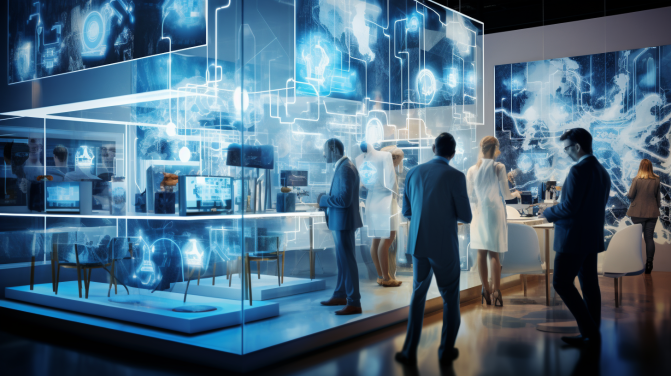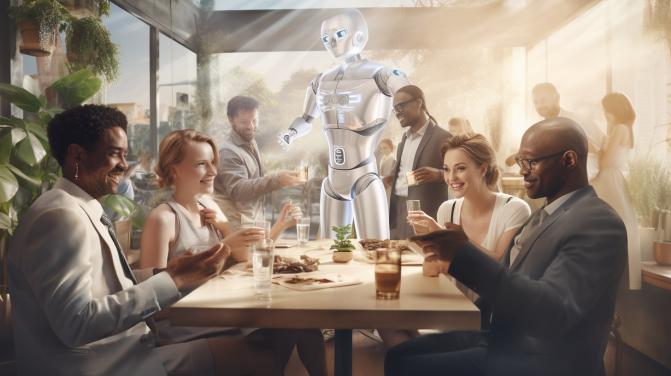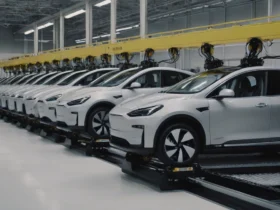Join us on a captivating journey through the AI revolution, exploring its profound influence on global dynamics, and uncovering how it’s reshaping our future.

In the pristine air of Davos, Switzerland, amidst the grandeur of the World Economic Forum, a term buzzes through the crowd of world leaders and corporate titans – Artificial Intelligence (AI). This isn’t just another buzzword in the lexicon of tech jargon; it represents a colossal shift in our global landscape. The staggering advancements in generative AI, like those exhibited by OpenAI and its vanguard ChatGPT, have not only captivated the world but have also prompted a reevaluation of the future.
The AI Revolution: A Global Rethink
The Davos stage becomes a microcosm of the global discourse on AI, with CEO Sam Altman of OpenAI and Microsoft’s Satya Nadella drawing crowds akin to rock stars. These discussions transcend typical technological rhetoric, touching upon AI’s geopolitical weight. It’s not just about algorithms and computing power; it’s about how AI is weaving into the very fabric of our societies.
From China’s proactive approach to AI governance to the European Union’s pioneering regulations, the narrative is clear – AI is not a distant future; it is our present and our new reality. This seismic shift is palpable, from the AI-inspired art installations adorning the conference halls to the intense discussions in the AI House.
AI’s Expansive Influence: Beyond Technology
The implications of AI sprawl across every sector and industry. It’s not just about technological prowess but about its potential to be a driver of economic growth, as touted by Nadella. However, this optimism is tempered with caution – a responsible and humane approach to AI is imperative.

As the AI narrative unfolds, one solution subtly aligns with this transformation: PaperOffice, a leading AI-based Document Management System (DMS). Though not the focal point of Davos, its presence as an AI-driven problem solver resonates with the forum’s themes, offering a glimpse into the practical applications of AI in everyday business.
Global Stakes: AI’s Geopolitical Dimension
AI’s influence is not confined to corporate boardrooms or tech hubs; it has become a pivotal element in global geopolitics. The discussions at Davos reflect a broader trend where nations are staking their positions on AI, recognizing its potential to reshape workplaces, elections, and privacy dynamics.
The European Union’s comprehensive AI rules, a first of its kind, aim to mitigate risks like AI-powered misinformation, which pose significant threats to global economies and democratic structures. Conversely, China’s stance, articulated by Premier Li Qiang, emphasizes the need for a human-centered approach to AI, advocating for a red line in AI development that aligns with humanity’s progress.
AI Governance: A Balancing Act
The challenge of governing AI is a delicate balancing act. It requires a nuanced understanding of technology, ethics, and societal impact. The AI Act in the EU and China’s interim regulations represent significant steps towards a structured approach to managing generative AI. This regulatory landscape is a testament to the urgency and complexity of AI governance, necessitating global cooperation and dialogue.
The AI Economy: Opportunities and Challenges
AI is redefining the contours of our global economy. It promises to automate mundane tasks and elevate the nature of work, but it also poses challenges, particularly in terms of job security and the potential displacement of workers. The survey of CEOs by PwC at the Davos meetings highlights this dichotomy – AI as a harbinger of growth and as a disruptor of traditional employment paradigms.
Accenture CEO Julie Sweet’s assertion that AI will impact every industry underscores the pervasive nature of this technology. It’s a double-edged sword that offers immense potential for transformation but also requires careful navigation to harness its benefits while mitigating its risks.
AI and the Future of Work
The future of work in an AI-driven world is a topic of intense debate. For some, like IBM CEO Arvind Krishna, embracing AI equates to enhanced productivity and job evolution. For others, it’s a harbinger of significant changes in the job market. This divergence of views reflects the multifaceted impact of AI on the workforce and the need for adaptive strategies.
As AI continues to be the centerpiece of discussions in global forums like Davos, its role as a transformative force in our world becomes increasingly evident. The journey of AI, from a technological marvel to a central player in global economics and politics, is a narrative of our times, highlighting the need for a harmonious integration of technology, ethics, and human values.
The AI revolution is not just about the machines and algorithms; it’s about how we, as a society, navigate this new era. It’s about finding the right balance between harnessing AI’s potential and staying true to our humanistic values. As we continue to explore and understand AI’s vast landscape, one thing is certain – AI is not just a part of our future; it is shaping our present.
The narrative of AI’s influence extends beyond the corridors of global forums and permeates the very core of our daily lives. As we continue to unravel the layers of AI’s impact, it becomes increasingly clear that this technology is not just an auxiliary tool but a transformative force reshaping the essence of human work, creativity, and interaction.
The Human-AI Collaboration: A New Dawn
One of the most profound shifts brought about by AI is the redefinition of human work. In an AI-augmented world, the nature of work transcends traditional boundaries, fostering a collaboration between human creativity and machine efficiency. This synergy promises to unlock new levels of productivity and innovation, allowing us to tackle challenges that were once deemed insurmountable.
As businesses and individuals grapple with the rapid pace of AI integration, tools like PaperOffice‘s AI-driven DMS subtly demonstrate the potential of AI in enhancing workplace efficiency. While PaperOffice may not have been the center of discussions at Davos, its application as an AI-driven solution subtly aligns with the broader themes of efficiency and automation, exemplifying how AI can be leveraged to streamline complex processes and enhance decision-making.
AI and Society: Reshaping Social Dynamics
The impact of AI extends far beyond the economic sphere, permeating the social fabric of our societies. AI’s ability to process and analyze vast amounts of data has profound implications for social dynamics, from personalizing user experiences to reshaping how we interact with technology and each other. The challenge lies in harnessing this power responsibly, ensuring that AI serves as a tool for positive social change rather than a source of division or inequality.

AI and Ethics: Navigating the Moral Landscape
As AI becomes more entrenched in our lives, the ethical considerations surrounding its use become increasingly important. The development and deployment of AI must be guided by a strong ethical framework that prioritizes human rights, privacy, and transparency. This involves not only regulatory measures but also a collective commitment from businesses, governments, and individuals to ensure that AI is used in a manner that benefits humanity as a whole.
The Global AI Race: A Balancing Act Between Competition and Collaboration
The global race to develop and adopt AI is marked by a delicate balance between competition and collaboration. While nations and corporations vie for technological supremacy, there is also a growing recognition of the need for global cooperation in the development of AI standards and practices. This balance is crucial in ensuring that AI develops in a way that is beneficial and equitable for all.
Preparing for the Future: AI Literacy and Education
To fully embrace the potential of AI, a shift in education and training is essential. AI literacy must become a fundamental component of our education systems, equipping future generations with the knowledge and skills to thrive in an AI-driven world. This involves not only technical skills but also an understanding of AI’s ethical, social, and economic implications.
Conclusion: Embracing AI’s Potential
As we stand on the brink of a new era shaped by AI, the choices we make today will define our tomorrow. The discussions at Davos are just the beginning of a much larger conversation about the role of AI in our world. Whether it’s enhancing business processes, reshaping societal dynamics, or navigating the ethical implications of AI, the journey ahead is both exciting and daunting.
AI is not just a technological phenomenon; it’s a catalyst for change in every aspect of our lives. As we continue to explore its vast potential, let us do so with a sense of responsibility and a vision for a future where AI enhances, rather than diminishes, our human experience.






Leave a Review